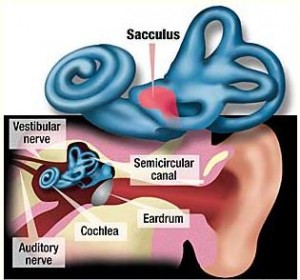 Jason, Matt, and I have all blogged about the importance of music to our workouts. There has been a lot of research about the effect of music on mood and even matching tempo to heart rate. There also appears to be a magic number for volume; Spinal Tap had it right all along.
Jason, Matt, and I have all blogged about the importance of music to our workouts. There has been a lot of research about the effect of music on mood and even matching tempo to heart rate. There also appears to be a magic number for volume; Spinal Tap had it right all along.
Dr. Neil Todd and his team has been cited extensively on their research regarding the sacculus, an organ in the inner ear that helps regulate balance. The sacculus is attached to the hypothalamus by the vestibular nerve. The hypothalamus is the part of the brain that helps regulate appetite, libido, temperature, anger, and fatigue. They report that this connection could explain the rush that many feel when their balance is effected through carnival rides, bungee jumping, or even swinging as a child.
They have found that the sacculus also appears to be stimulated by sounds above 90 decibels. A very similar physical and emotional rush can be experienced when we listen to music above 90 decibels. Todd has stated that “the distribution of frequencies that are typical in rock concerts and at dance clubs almost seem designed to stimulate the sacculus.” Rock and dance music are often the most commonly chosen playlists for exercise, and most people like to turn the volume up to drown out the rest of the world, likely putting you at or above the 90 decibel level.
Normal conversation is approximately 60 decibels, a dial tone is about 80 decibels, and street traffic while sitting in your car is approximately 80 decibels. Singing (you know you rock out in the car) can have the same effect on your sacculus. No wonder we love turning up our tunes and hearing ourselves sing while driving in traffic; it’s not just the acoustics of your vehicle. Large groups of people chanting or cheering can also have a similar effect, adding to the emotional tie to your favorite football team; isn’t it more fun to watch the big game at the stadium or a party?
Exercise alone provides a sense of euphoria, improves circadian rhythms, and improves mood. Music helps us prepare for exercise, makes it more enjoyable, and helps us extend our workouts. When listening to loud music, you may be regulating appetite, temperature, libido, fatigue, and mood through your hypothalamus. However, research states that continued exposure to noises above 85 decibels can cause hearing loss, so we are not suggesting that you turn up the tunes too far.
